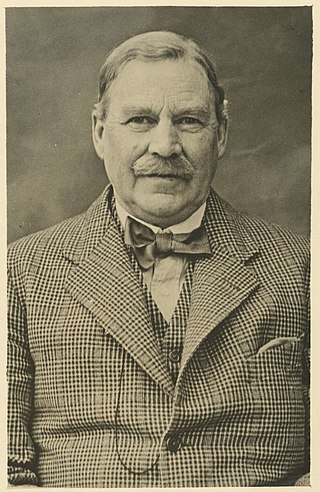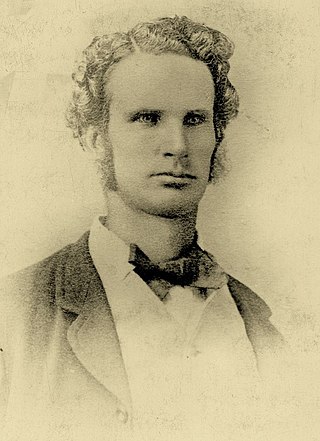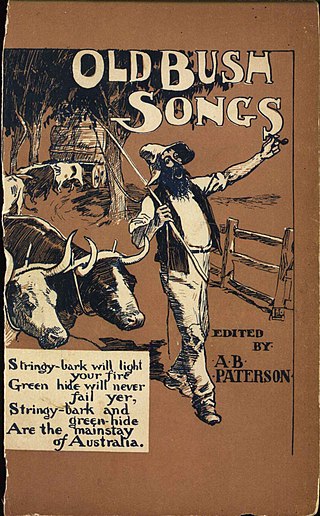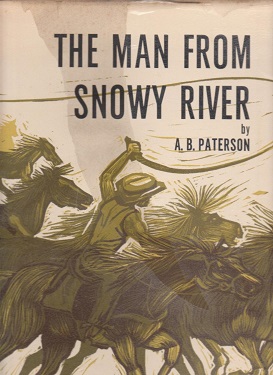
William Henry Ogilvie was a Scottish-Australian narrative poet and horseman, jackaroo, and drover, and described as a quiet-spoken handsome Scot of medium height, with a fair moustache and red complexion. He was also known as Will Ogilvie, by the pen names including 'Glenrowan' and the lesser 'Swingle-Bar', and by his initials, WHO.

Adam Lindsay Gordon was a British-Australian poet, horseman, police officer and politician. He was the first Australian poet to gain considerable recognition overseas, and according to his contemporary, writer Marcus Clarke, Gordon's work represented "the beginnings of a national school of Australian poetry".
Nationality words link to articles with information on the nation's poetry or literature.
Nationality words link to articles with information on the nation's poetry or literature.
Douglas Stewart was a major twentieth century Australian poet, as well as short story writer, essayist and literary editor. He published 13 collections of poetry, 5 verse plays, including the well-known Fire on the Snow, many short stories and critical essays, and biographies of Norman Lindsay and Kenneth Slessor. He also edited several poetry anthologies.

The bush ballad, bush song, or bush poem is a style of poetry and folk music that depicts the life, character and scenery of the Australian bush. The typical bush ballad employs a straightforward rhyme structure to narrate a story, often one of action and adventure, and uses language that is colourful, colloquial, and idiomatically Australian. Bush ballads range in tone from humorous to melancholic, and many explore themes of Australian folklore, including bushranging, droving, droughts, floods, life on the frontier, and relations between Indigenous and non-Indigenous Australians.
The Sick Stockrider is a 1913 film directed by W. J. Lincoln based on the 1870 poem of the same title by Adam Lindsay Gordon. It was the first production from Lincoln-Cass Films and is one of the few Australian silent films to survive in its entirety.
"Bell-Birds" is a poem by Australian writer Henry Kendall that was first published in The Sydney Morning Herald on 25 November 1867.
"The Creek of the Four Graves" is a poem by Australian writer Charles Harpur that was first published in three parts in The Weekly Register of Politics, Facts and General Literature on 9 August, 16 August and 23 August 1845.
A Mid-Summer Noon in the Australian Forest is a poem by Australian poet Charles Harpur. It was first published in The Empire magazine on 27 May 1851, and later in the poet's poetry collection Poems (1883).
The Women of the West is a poem by Australian poet George Essex Evans. It was first published in The Argus newspaper on 7 September 1901, and later in the poet's poetry collection The Secret Key and Other Verses (1906).
"The Last of His Tribe" is a poem by Australian writer Henry Kendall that was first published in The Sydney Morning Herald on 27 September 1864, under the title "Woonoona: The Last of His Tribe".
Andy's Gone With Cattle is a poem by Australian writer and poet Henry Lawson. It was first published in The Australian Town & Country Journal on 13 October 1888.

The Man from Snowy River and Other Verses (1895) is the first collection of poems by Australian poet Banjo Paterson. It was released in hardback by Angus and Robertson in 1895, and features the poet's widely anthologised poems "The Man from Snowy River", "Clancy of the Overflow", "Saltbush Bill" and "The Man from Ironbark". It also contains the poet's first two poems that featured in The Bulletin Debate, a famous dispute in The Bulletin magazine from 1892-93 between Paterson and Henry Lawson.

The Teams is a poem by Australian writer and poet Henry Lawson. It was first published in the Australian Town and Country Journal on 21 December 1889. It was later published in the poet's poetry collection In the Days When the World Was Wide and Other Verses in 1896.
This article presents a list of the historical events and publications of Australian literature during 1870.
Bush Ballads and Galloping Rhymes (1870) is the second poetry collection by Australian poet Adam Lindsay Gordon. It was also the last collection to be published during the poet's lifetime appearing only the day before the author's suicide.
The Oxford Book of Australasian Verse (1918) is anthology of poems by Australian and New Zealand poets edited by Walter Murdoch. It was published in hardback by Oxford University Press in London in 1918
"Song of the Shingle Splitters" (1874) is a poem by Australian poet Henry Kendall.




